
Topics
We speak with attorney Julia Tarver who is representing detainees at Guanatanamo Bay. She says her clients–who are participating in a hunger strike to protest their mistreatment and indefinite detention–told her guards and medical staff forcibly shoved large feeding tubes up their noses and down into their stomachs, and used the same tubes from one patient to another. [includes rush transcript]
For the past three months, over 100 detainees being held at Guantanamo Bay have been on a hunger strike protesting their conditions at the prison and their indefinite detentions. The United States is holding about 500 detainees at Guantanamo. Some prisoners have now been held for almost four years without charge.
The hunger strike began in the first week of August. At its height in mid-September, 131 detainees were participating. In newly declassified documents, made public by their defense attorneys, detainees on the strike claim that they were mistreated by U.S soldiers. The detainees say that they were violently force-fed with large, dirty feeding tubes and that the soldiers taunted them, saying that the treatment was intended to force them to end the strike.
- Julia Tarver, attorney with the New York City-based law firm of Paul, Weiss, Rifkind, Wharton & Garrison LLP and cooperating counsel with the Center for Constitutional Rights.
Transcript
AMY GOODMAN: We’re now joined by Julia Tarver. She’s an attorney representing ten detainees at Guantanamo Bay. Three are on hunger strike. She returned from Guantanamo on October 2. Welcome to Democracy Now!
JULIA TARVER: Thank you.
AMY GOODMAN: What have you found?
JULIA TARVER: What we found is that the situation at Guantanamo has deteriorated drastically, even since our previous visit at the end of July. The level of hopelessness in the camp has reached a point where our clients are literally vowing they have no other choice but to die. The treatment they are receiving from the guards and the medical staff at Guantanamo is very, very disturbing.
What we’ve learned is that in some sort of ill-advised attempt to stop the hunger strike, the guards and the medical staff are using intervention, medical intervention, to actually inflict forms of torture on our clients. They claim that in order to preserve life at the base they are inserting tubes into the clients’ noses that go down into their stomachs, and they’re able to be fed that way.
But the problem is the clients have told us horrific stories repeatedly, from different clients, about how these same tubes are being forcibly inserted in by riot guards, how they’re taken from one detainee and inserted into the next detainee with no sanitization, with the bile and the blood still on the tube from the previous detainee.
JUAN GONZALEZ: And all the while these detainees are shackled most of the time? What did you find?
JULIA TARVER: What we’ve understood is that for various periods of time they were definitely shackled, multiple shackles on their arms, on their legs, on their knees, on their heads. When they insisted over and over again that they would not resist, because they knew resistance was futile, some of that shackling stopped. But every time, we understand, that the tubes were inserted, these riot teams were involved. Six men holding one client down while someone inserts a tube up their nose and into their stomach.
AMY GOODMAN: How do you get this information? Do you meet with your clients at Guantanamo?
JULIA TARVER: Exactly. You know, the government, in the hearing we had last week, dismissed these allegations as mere storytelling, an accusation from them that I found rather insulting, because I, myself, was there. I saw my clients’ condition. I saw them with the tubes up their noses. We had independent interviews with more than one client, who had had no way to contact each other in between, who told us precisely the same horrific tales.
AMY GOODMAN: Now, Julia Tarver, you’re a cooperating counsel with the Center for Constitutional Rights.
JULIA TARVER: That’s right.
AMY GOODMAN: But you’re with the corporate law firm, Paul, Weiss, Rifkind, Wharton & Garrison.
JULIA TARVER: That’s right.
AMY GOODMAN: What do you usually do? What kind of legal work?
JULIA TARVER: My usual legal work is various complex and high-profile litigation for Fortune 500, 100 companies. Paul, Weiss also has a very proud tradition of doing pro bono work, so this is one example of the type of pro bono work we do.
JUAN GONZALEZ: And the kind of conditions that you encountered here in Guantanamo? I know you said earlier before we went on the air that you had done some death penalty work. Compare the kinds of conditions you find here to the jails that you’ve dealt with here in the United States.
JULIA TARVER: Well, the most frustrating thing for me as a lawyer and, I think, for our clients is that in the death penalty context no matter how severe it may seem at times, there is a court. You know that one day your rights and your claims will be heard. There is a predictable process. There is a process for justice. The real hopelessness that is driving this strike at Guantanamo is they have no idea when, if ever, justice will come to them.
AMY GOODMAN: What is the U.S. government response?
JULIA TARVER: The government filed a response yesterday. Quite frankly, they didn’t even want to file a response. They didn’t think the allegations merited a response. But a judge in the D.C. District Court rather strongly advised them. She thought it was in the government’s best interest to have them file a response. In that response, they concede some of the things that we have alleged, while at the same time claiming that this is all for the detainees’ own benefit and that it’s all being done in a medically appropriate way.
AMY GOODMAN: What about the role of medical officers in what’s happening to these detainees? Doctors, psychologists?
JULIA TARVER: That was one of the most shocking things that we heard when we asked our clients, you know, when these riot teams were involved in this behavior, when they reinserted a tube from another detainee, surely no doctor was present. And they more than once said a doctor was present.
AMY GOODMAN: Who?
JULIA TARVER: Actually, that’s still classified by the government, unfortunately.
AMY GOODMAN: What do you mean?
JULIA TARVER: The government has not permitted us to speak publicly about the descriptions we received of that medical doctor.
JUAN GONZALEZ: And what about the taunting that — the alleged taunting that has occurred in some cases?
JULIA TARVER: Well, again, I think, you know, at the very time these people are gravely ill, such to the point that the military is recognizing forced medical intervention has to happen, you have people who are taunting the clients, saying, “This is what your religion has brought you. You have to stop the hunger strike. We will not let you die.” They’re taunting them. They’re not allowing them to sleep. It’s really quite horrific behavior.
AMY GOODMAN: Have you talked to the commander of the camp?
JULIA TARVER: We’ve talked to everyone we could. We don’t get a very positive response, quite frankly, when we’re down at Guantanamo. There’s very little that the government will do to us as lawyers to respond to our complaints. They seem to think that Guantanamo is a jurisdiction unto its own with no laws and no justice.
AMY GOODMAN: So how does this compare to your other work? I mean, were you surprised when you actually went down, although you had presumably heard a lot of descriptions secondhand?
JULIA TARVER: We had been on our trip in July. It was right after first hunger strike. So we had seen what it was like to meet with these clients when they had been on a hunger strike for a long period of time. But the situation is drastically different. This is really sort of an Alice in Wonderland-type environment for us, because we’re trying to gain the trust of these clients, trying to give them some hope that the American judicial system will intervene, will get them charged or released, as is the American way.
AMY GOODMAN: So, they have not been charged?
JULIA TARVER: They have not been charged by any judicial system.
AMY GOODMAN: How long have they been held?
JULIA TARVER: Our clients have been held for nearly four years.
AMY GOODMAN: And you have no idea why they’re being held?
JULIA TARVER: We know that the President made a blanket statement about all the 500-plus detainees, that they were all enemy combatants. We know that combatant status review tribunals, that our clients don’t even really participate in, were held in which the military confirmed their own decision that these were enemy combatants. But there has been no real evidence of the type cognizable in any court of law in the united states.
JUAN GONZALEZ: And are you free to talk about the particular condition of your — you have three clients that you’re representing there?
JULIA TARVER: We actually have ten clients, three of whom are in the most grave condition.
JUAN GONZALEZ: And in terms of how it was that they say they got to Guantanamo?
JULIA TARVER: We’ve been able to talk with them. But the government has a blanket rule that anything they say to us is automatically classified until we take the steps to present it to the government and try to persuade them to declassify it.
AMY GOODMAN: Do you think the extent of the difficulty, to put it mildly, of the conditions is being conveyed in the media in this country?
JULIA TARVER: Sadly, I don’t understand why it is not. But it clearly is not. You know, I speak to my colleagues at the office and other friends around the country, and they have no idea what’s happening at Guantanamo.
AMY GOODMAN: What do you think needs to happen to change the conditions? I mean, is it — you’re representing your clients in a courtroom. What else do you think needs to happen?
JULIA TARVER: I think that, you know, the C.C.R., and others involved in this work, has continually called for some kind of a commission, an independent body to investigate what is happening at Guantanamo and other places where the U.S. military has admitted it doesn’t believe that the Geneva Conventions apply.
AMY GOODMAN: And this idea of your not being a lawyer for C.C.R., but a cooperating counsel with a corporate law firm, how many law firms are doing this kind of work pro bono?
JULIA TARVER: There are hundreds of lawyers around the country doing this work pro bono. Many, many important private law firms and also solo practitioners are involved in this work.
JUAN GONZALEZ: And have the main Bar associations, do you believe, been vocal enough in terms of raising the issues of what are some of the fundamental legal problems occurring with these detainees?
JULIA TARVER: The Bar associations have done some. I don’t think it’s ever been enough. I think a lot more needs to be done. But I think the fundamental problem is we need someone who listens to these voices and cares and someone who will help us get some kind of independent commission and oversight of these activities.
AMY GOODMAN: Julia Tarver, I want to thank you very much for being with us
JULIA TARVER: Thank you.
AMY GOODMAN: Julia Tarver is a cooperating attorney with Center for Constitutional Rights. She’s with the New York City based corporate law firm, Paul, Weiss, Rifkind, Wharton & Garrison.


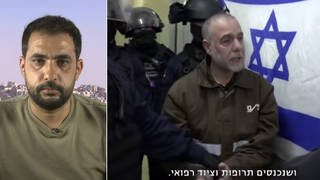
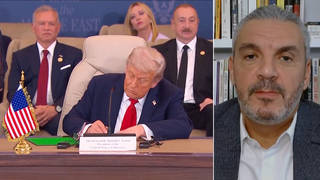
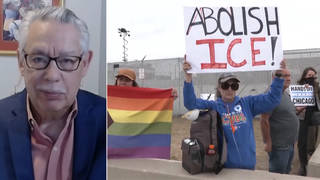





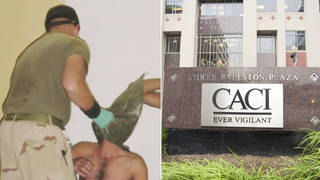
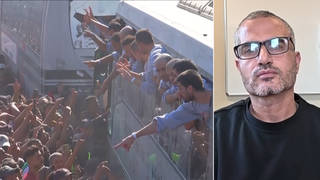
Media Options